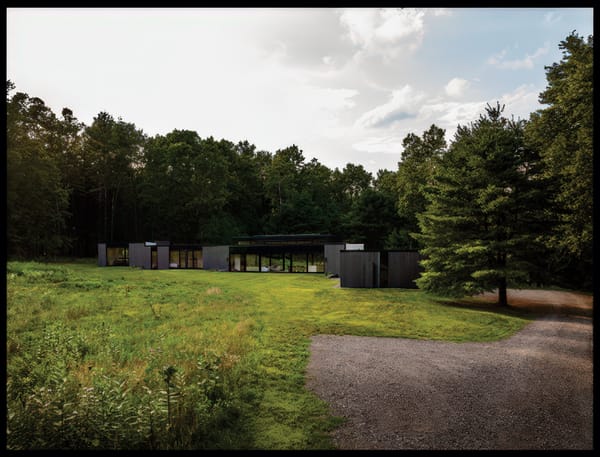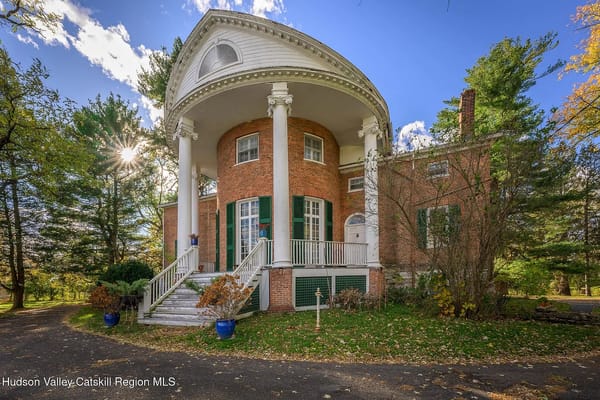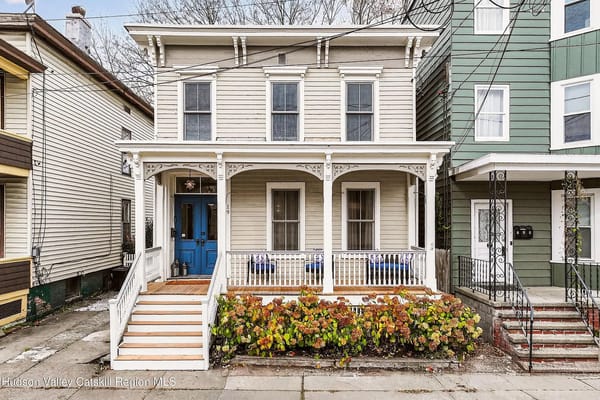"This is a sorry sight." —Macbeth

Update, July 6, 2008: Granted a six-month reprieve by the banks, The Mount had raised $1,000,000 by mid-June—just one-third the amount needed by October 31 to forestall foreclosure. Along with it's other troubles (detailed below), The Mount may be victim of a trend being whispered about by members of the boards of historic landmarks nationwide: tourists' interest appears to be on the wane. Ticket sales are rumored to be down at sites as established as Colonial Williamsburg in Virginia and Old Salem in Winston-Salem, NC. To survive, sites both within our own community (Clermont, Olana) and beyond are trying to wean themselves of their dependence on tourists by becoming community resources. Of course, new programs cost money. —M.B. "The plot is Shakespearean," said my friend the Berkshire Babe, who was in the audience Monday night at Lenox Town Hall, where more than 100 people attended a public forum on the future of The Mount, the Edith Wharton Estate and Gardens. It's become clear that the current financial crisis (owing millions to Berkshire Bank) has a complex, tragic and compelling backstory, which must be why The New Yorker has assigned reporter Rebecca Mead to write a feature article that is due out later this month The Mount is a regional Rorschach Test--it means different things to different people. The business community sees it as a tourist attraction (along with Tanglewood, the Norman Rockwell Museum et al.) The cultural community considers it a literary landmark. History buffs treasure it as a valuable vestige of the Berkshires' Gilded Age. And locals with long memories think of it as the birthplace of Tina Packer's 31-year-old Shakespeare & Company, the theater troupe that first brought the derelict Mount back to life when it was in residence there, putting on plays in the house and in the woods. They also remember that it was Stephanie Copeland, who ran The Mount from 1993 until last week when she resigned, who first tried to evict Shakespeare & Company in the 1990s, which became an ugly, public battle and the wounds have apparently never healed. After all, Copeland had once been Shakespeare's & Company's director of development. Copeland sat silently in the back of the Lenox Town Hall on Monday night. "She was shaking," observed the Berkshire Babe. "She may have screwed up financially, but she did do a pretty remarkable job restoring the house and gardens. You can't take that away from her. I keep thinking, poor Stephanie." But others are less charitable in judging Copeland's accomplishments and bemoan that the house is basically a shell that does not animate Wharton's life. They say the installation a few years ago of decorator show-house rooms (which were supposed to generate publicity and tickets sales) was not only confusing but also counterproductive. Gordon Travers, the only member of The Mount's board of trustees to live in the Berkshires (he has a weekend house in Sheffield), wanted to focus on the future. "It's easy to be a Monday morning quarterback," he said. "In hindsight the wrong decisions were made." One of those decisions was the 2005 purchase of Edith Wharton's library for $2.6 from an English book collector without having the money in the bank to pay for it. "It was something of a Hail Mary," said Travers. He thinks The Mount is a better institution for owning the library but could prosper without it: "We would sell the library if the right buyer came along if it meant we could save the property." Travers explained that the Berkshire Bank was doing its best to be patient with The Mount, but that the bank has a fiduciary responsibility to its stockholders and employees. He said the threat of foreclosure is very real and that the bank would probably have no trouble finding someone with deep pockets who would like to buy the property and turn it into a private residence. Having raised $580,000 in the past five weeks, the board hopes that it can convince the bank to hold on until the summer when The Mount will be able to use admission receipts to pay for operating expenses while continuing its quest to raise $3 million to satisfy the bank and win a $3 million matching grant (payable over five years) from an anonymous donor. "We're in a triage situation," said Travers, who noted that the five member board needs to be three or four times larger. "It is of critical importance to us that a number of these new positions be filled by local Berkshire people with the time, commitment, vision and fund-raising capability to achieve success," he said. Like an episode of Gilmore Girls, a quirky parade of locals came to the microphone to share thoughts about how to save The Mount. Nancy Goldberg, the owner of Belvoir Terrace, a nearby summer camp, was blunt: "I suggest you get fifteen people from New York City to give you $1 million a piece." Joy Schmidt, the head of the Friends of the Lanesboro Library, brought her knitting with her to the podium. "I am knitting a prayer shawl and I wish I could wrap it around The Mount," she said. When Tina Packer stood to speak, she received rousing applause. She looked Travers and fellow board member Hannah Burns straight in the eye: "You're strangers to us. You are not part of the community." She said she wants to see The Mount succeed but does not believe that will happen unless a new direction is taken. "It can't live as a cold museum," she said. "The library does not hack it. The library does not belong to the people. The plays in the woods belong to the people." The notion that Packer would return to The Mount (which is just down the road from Shakespeare & Company's campus) and put on plays now that her rival was felled certainly seemed like a plot twist worthy of Shakespeare himself.








